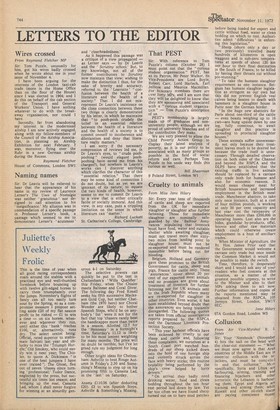Cruelty to animals
From Miss Jane Hilary Sir: Every year tens of thousands of cattle and sheep are exported from the UK for immediate slaughter or slaughter after further fattening. Those for immediate slaughter are nominally safeguarded by the 'Balfour Assurances ' stipulating that livestock 'must have food, water and suitable shelter while awaiting slaughter: must not travel more than sixtytwo miles from landing point to slaughter house; must not be re-exported and must be rendered insensible before being cut for bleeding.
Belgium, Holland and Germany gave these promises to the British Government for cattle, sheep and pigs, France for cattle only. These ' assurances ' cover about 20 per cent of our exported meat animals and no promises are given about treatment of livestock for further fattening nor for UK. animals sent to the Irish Republic where many are re-exported for slaughter in other countries. Even worse, it has been established beyond doubt that the assurances are being blatantly disregarded. The following quotes are taken from official investigation reports prepared by the RSPCA and the Dartmoor Livestock Protection Society. "This year harbour officials have been sickened by cruelty to our sheep and cattle and, following these complaints, we ourselves at a South Coast port watched hundreds of our sheep kicked down into the hold of one foreign ship and violently struck across the face with heavy sticks; this routine brutality being performed by the ship's • crew helped by lorry drivers."
"On arrival they badly need drinking water, food and clean bedding throughout the ten hour rest period •laid down by law. Yet far too cften we have found sheep turned out on to bare mud patches
before being loaded for export and cattle without foed, water or clean bedding on which to rest. Authorities admit difficulties ' in enforcing this legislation."
"Sheep (shorn only a day or two previously) travelled many hundreds of kilometres in open waggons and in sub-zero temperatures at speeds of about 120 km oer hour to their final destination in the South of France, to be killed by having their throats cut without pre-stunning."
"To take the humane slaughter requirement as one instance. Belgium has humane slaughter legislation as stringent as our own but this did not prevent English veal calves being beaten to death with hammers in a slaughter house in Putte near the German border.
"In the huge new abattoirs for Paris about one-third of the cattle — even beasts weighing up to 16 cwt—are hung upside down by one leg, fully conscious, to await slaughter and this practice is spreading to provincial slaughter houses."
These animals suffer unnecessarily not only because their treatment leaves much to be desired but because the trade itself is unnecessary. Through detailed observation on both sides of the Channel and beyond the RSPCA and the DLPS have established that the existing traffic in live animals should be replaced by a carcase only trade both for humane and also for economic reasons. It would mean cheaper meat for British housewives and increased employment in the British meat trade, Manchester abattoir, to take only once instance, built at a cost of four million pounds, is working at only 50 per cent capacity and last year cost the ratepayers of Manchester more than £350,000 in operating losses. Lost also are the hides, glandular by-products, offal, hooves and other raw materials which could otherwise create employment in a host of ancillary trades. • When Minister of Agriculture, the Rt. Hon. James Prior said that the Government would welcome a carcase only trade but once inside the Common Market it would not be possible to make the switch.
Time, therefore, is desperately short and I would ask any of your readers who feel concern at this situation, as a matter of the greatest possible urgency, to write to the Miniser and also to their MPs asking them to act now. Further information and copies of the reports mentioned may be obtained from the RSPCA, 105 Jermyn Street, London, SW1Y SEC.
Jane Hilary 67A Gordon Road, London W5


















































 Previous page
Previous page